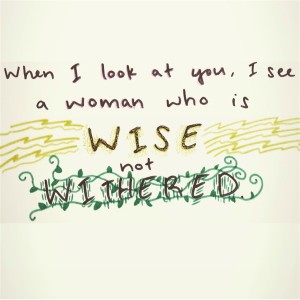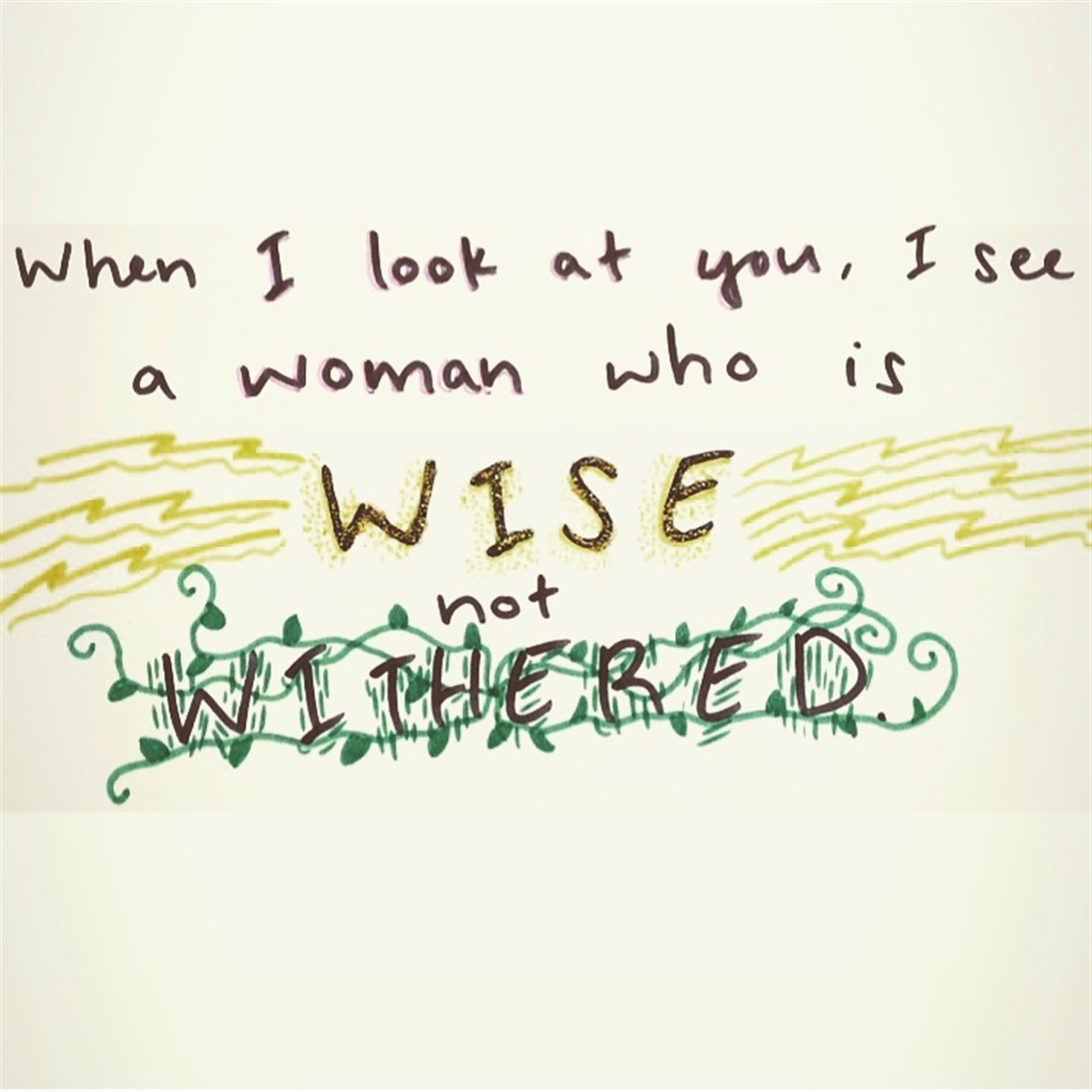Episodes

Sunday Nov 17, 2019
Magical Librarian - BASIRA
Sunday Nov 17, 2019
Sunday Nov 17, 2019
Welcome to the Wise Not Withered Podcast, Season 2: The Character Showcase! This is Week 2. Today I am thrilled to exhibit Basira, a seventy-year-old Pakistani woman who manages a library. Basira lost her husband and son ten years prior to the beginning of the story, and she has become very jaded, bitter, and cold. At the library where she works, she discovers a mysterious book that becomes a portal to a magical world. In this storybook land, Basira meets a little girl who helps her through her journey of love, grief, and connecting to and nurturing her inner child.
The writer who chose this character, Noor Pinna from New York, beautifully wove in really nice and specific details from her Pakistani heritage into what she wrote. The whole canvas of imagery and feel of the story comes entirely from Noor, from Basira's brightly colored shalwar kameez and hijab, her meals of chai and scrambled eggs, chicken and curry with naan, to the environmental scenery details in the storybook land (like the babul tree and river dolphin), and Basira's Islamic faith and Urdu prayer.
The story is both heart-breaking and heart-warming. I wanted a balanced mixture of sweet and sad; Noor and I both contributed so many tender and delicate moments, as well as raw, emotional parts. When I first got the idea for the Magical Librarian, I wasn't sure if I wanted to explicitly say how her family had passed away. But when Noor wrote about a suicide bombing as the cause, it felt right to keep it in the story. That kind of tragedy is unfortunately more common in countries like Pakistan, and it felt important to include, to show how these catastrophic events affect regular people who are just trying to live their lives, with pure hearts and good intentions.
The description that Noor wrote of the last day Basira was with her family absolutely broke my heart. The suicide bombing happened while Basira was away from them, getting some mango kulfi, a dense and creamy frozen dairy dessert, for herself and her son. The juxtaposition of light-heartedness and pure joy of enjoying a sweet treat with the jarring event that was the bombing made the tragedy hit even harder.
I really cried when I first read that scene. It is a very important part of the story, and highlights a key underlying lesson of acceptance of the simultaneous existence of joy and grief. Even when feeling great sorrow and grief, one can still have happy moments as well, and that's okay. The older we get, and the more we experience, the more likely we are to experience both joy and pain to very deep levels.
I really loved the prayer that Noor wrote for Basira.
"بِسْمِ اللَّهِ الرَّحْمَنِ الرَّحِيمِ / In the Name of Allah, the All-merciful, the All-compassionate
اللَّهُمَّ مَوْلايَ / O Allah! O my Protector!
اللَّهُمَّ عَظُمَ بَلائِي / O Allah, my tribulation is tremendous,
لَهِي وَرَبِّي مَن لِّي غَيْرُكَ أَسْألُهُ كَشْفَ ضُرِّي وَالْنَّظَرَ فِي أَمْرِي! / My God and my Lord! Have I any but You from whom
to ask removal of my affliction and regard for my affairs!
وَّعَلَيَّ فِي جَمِيعِ الأُمُورِ عَطُوفاً / And be gracious to me in all that I do!"
I wanted to include as many parts of people's cultures into each story as we could, and it feels really special to have the beautiful Urdu letters in the text. Portraying a Muslim woman and her Islamic faith in a positive light also was really important to include. I feel that ultimately Basira's connection to her inner child and her faith is what helped her through the hard times.
The connection to the little girl—who turns out to be herself, her own inner little girl—was the core concept that I came up with from the start. Noor did a wonderful job of telling the story like a stroll down memory lane: Basira recognizes the places that they travel to because she herself had been there decades earlier as she was growing up.
The inclusion of the child in the story is a reminder that there is still a child within each of us, and connecting to and understanding our inner child can help us find peace. At the beginning of the story, we describe a list of people in Basira's life that she is unhappy with:
"The excessively friendly young man Ahmed who managed the library with her… The women her age who bothered her while she was busy shelving books, whining about not knowing what novel to pick up next… Her older brother Afshad who never called anymore…"
In the ending, we include a similar list of people who surround her, except this time, after the list, it is implied that she is focusing on rekindling and appreciating those connections, and accepting love and joy into her life again. The last illustration is of Basira reading a storybook, surrounded by a group of children. It's a visual epilogue of sorts, showing that Basira will start to connect more with the children in her community.
Our illustrator for Basira was Monica Meius from Estonia, who's currently living in Finland. I am positively delighted by the illustrations that Monica made for Basira's story. I think she captured the characters perfectly, and the bright colors and overall design is very much like a storybook itself.
I found Noor on Instagram by searching some kind of poetry hashtag, and I really liked the content she had. Seeing that she is a therapist and a mindset coach, it wasn't surprising that she was interested in and capable of writing about a character who goes through very hard times and comes out stronger.
Noor took some time to answer a few questions that I had about herself and her background, main takeaways from Basira's story, and her experience being part of the Wise Not Withered project. So, here's Noor!
"Hi! My name is Noor Pinna. I'm a licensed mental health therapist, and a transformation mindset coach. I work with women over twenty-five who are willing to work with me on overcoming their shame, creating boundaries, and creating uniquely tailored self-care plans so that they can be leaders in their own universe. I really enjoy hiking, being in nature, writing poetry, and having potluck with diverse cultural foods.
Some of the main takeaways that I wanted people to have from the story is that grief varies, and it's not linear. You can heal from many different resources, as long as you are [willing and able to] open that door a little bit for that light to come in, so that you can receive the benefits and the support of other people. But it has to start with you.
The other thing that I wanted people to take away from the story was that, you know, there's a stereotype that women in my culture are submissive, and are not able to have any say, or they can't have businesses or things like that. And in this story, I really wanted to show that regardless of your age, a woman in my culture can have a job, is a contribution, and can provide support and be an empowering female for others, and still chase after her dreams.
[The Wise Not Withered project] is something that I really enjoyed. It was something new. It was all about empowering females from all different types of cultures, backgrounds, and age. I thought this was a unique thing for women of all ages—adolescents, young girls, young women—to be able to say hey, these are really strong female characters. They're providing me a lesson, a resource, an inspiration. There's nothing better than to offer more insight and more empowerment. Because we have to, as a community, lift [one another] up, we have to empower women together, and not tear each other down. And this is what I felt like the essence of this project was: we were lifting women together, as well as involving other characters that were male in the process of this project."
—
Stay tuned for more showcases of the Wise Not Withered characters, releasing every Sunday until the end of April, 2020!


No comments yet. Be the first to say something!